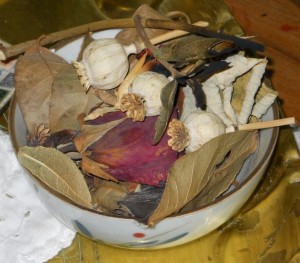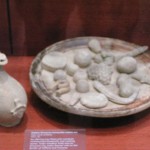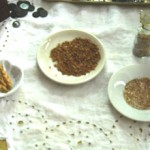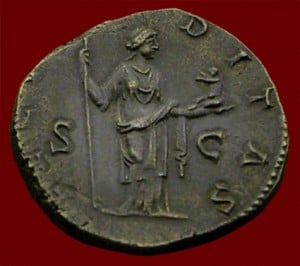
Numa Pompilius developed rituals for Rome that were complex and difficult to perform, but not expensive. In this way he promoted reverence among the Romans without barring even the poorest from worshiping the Gods. “He gave (the pontifex) full solemn written instructions about the ceremonies, specifying for each sacrifice the proper offerings, the proper days and the proper temples and the way in which money should be raised to meet the expenses (Livy 1.20.5-6).”
Today we can get some idea of the extent those instructions may have been by looking at Jewish texts – Bamidbar (Numbers), Vayikra (Leviticus), Jubilees, the Temple Scroll (11Q 19-20) and other fragments, and consider that Rome held far more temples that had Jerusalem. But all that remains today are a few fragments of the laws recorded in the Libri Pontifici. We therefore begin with the little we do know as the basis for a modern practice of the Religio Romana. In prohibiting immolationes, Numa provided, in general, that oblationes “consist of flour, wine, and the least costly offerings (Plutarch Numa 8.8).” He said that wine served to the Gods had to come from vines that were pruned, and thus cultivated, rather than from wild grapes (Plutarch Numa 14.3). Somewhat reminiscent of Jewish dietary laws, Numa prohibited sea creatures from being offered to the Gods except for scaled fish (Hemina Annales apud Pliny, N.H., 32, 2, 20 ; Cf. Fest., F. 253). As each new sanctuary was added to Rome, and a new cultus established for each, the body of regulations on proper offerings, and what were prohibited, only increased. “Lex Aemilia specifically decreed that no rat, mouse, or dormouse should ever be served up as an offering to the Gods (Pliny, N. H. 8.57).” The ius Papirianum attributed a law to Numa that made it “forbidden to pollute laurel and the olive in unholy uses, so that they must not be employed even for making a fire at altars and shrines when divinities are to be propitiated (Pliny N. H. 15.135).”

In addition to such general rules, each individual sanctuary had its own regulations (lex templi). Men were disbarred from entering the temple grounds of the Bona Dea, although certain men who were selected by the Goddess Herself could enter some parts of Her sanctuary. A well known prohibition concerned the sacred grove of Carmentis that was located at the foot of the Capitoline Hill. “It is unlawful to lug skins into the shrine (of Carmentis), lest the pure hearths be defiled by death (Ovid Fasti 1.629-30).” Mars preferred iron to other metals, while bronze implements had to be used in ceremonies held for Ceres, since iron and its alloys were forbidden to Her rites. This applied at the sanctuaries of other Goddesses and Gods as well.
“Into this locus nothing made of cast metal may be brought and no carcasses may be projected over its altars, and no sacrifices may be made for deceased parents. If against this rule a small altar is set up, then it will be permitted for a magistrate to hand down any judgment and set whatever fines he may wish (ILS 4912).”

There were regulations on what offerings were deemed appropriate for each individual God and Goddess, and in some cases what was prohibited from being offered to specific deities.
“Nobody, for instance, would sacrifice a piglet to Serapis, but they do to Hercules and Asculapius. It is unlawful to sacrifice sheep to Isis, but sheep are a proper sacrifice to the Mater Deorum and to other Gods. . . . A horse is a proper sacrifice for Neptune, but to Apollo, especially Apollo of Didyma, the animal is hateful. It is pious to sacrifice goats to Diana, but not to Asculapius (Sext. Emp. Outlines 3.220-221).”
Today we glean such information from ancient sources. Working together over the past ten years, pontiffs Gryllus Graecus, Salvius Austur, and myself, Marcus Horatius, have developed a guide on oblations for specific Gods and Goddesses, a summary of which is provided below.
Guide for Oblations
Adonis: barley, fennel, roses, release of white doves.
Apollo: bay laurel, calendula, hyacinth, wheat, crowns of laurel, cheese, honey, parsley, wine.
Asclepius: butterfly weed, milkweed, mustard, thin-leaf parsnip.
Carna: beans mixed with spelt and bacon.
Castor and Pollux: frankincense.
Ceres: barley, bread, crown of wheat (corona spicea), crown of oak leaves, dittany of Crete, flour, honey combs mixed in milk, hyacinth, incense, oak leaves, pennyroyal, poppies, spelt cakes, salt, storax, violets, wheat, first sampling of ears of wheat, wine.
Chiron: chiron vine, greater centaury, St. John’s wort, wormwood, yarrow.
Diana: cakes of cheese, cakes of honey, cakes of parsley, hazel, jasmine, lavender, mandrake, rosemary, wormwood.
Dis Pater: hemlock tree.
Faustus: ivy, pine.
Hecate: garlic, hemlock, mandrake, rue.
Hercules: Aconite, black poplar tree, henbane, herb Robert, monkshood, opopanax, oregano, water lilies.
Genius or Juno: incense, liba wheat cakes, wine.
Janus: incense, strues cakes, wine.
Juno: blue flag iris, cypress tree, incense, lily, orris root, saffron, silver, wild fig, wine.
Juno Lucina: cakes of cheese, cakes of honey, cakes of parsley.
Juppiter: bay laurel, beans and greens, beech tree, benzoin, cassia, cinnabar, cinnamon, far cakes, fertum cakes, fluorspar, frankincense, fruits, holm oak, marjoram, oak, saffron, sage, verbena, wine.
Lares: bread, flour, flowers, fruit, incense, juniper, milk, myrtle, salt, water, wine.
Liber and Libera: honey, ivy, liba cakes, libations of must, mint, pennyroyal, wine.
Manes: black beans, milk, roses, salt, violets, water, wheat corns, wheat mixed in wine.
Mars: bacon fat, cinnamon, clover, fertum cakes, iron, peony, strues cakes.
Mater Larum, Mania, Mater Manua: garlic, poppyheads.
Mercury: beans and greens, crocus, cypress, dill, frankincense, hellebore niger, herb mercury (mercurialis annua), marjoram, myrtle.
Minerva: ampelos or chiron vine, dogbur mixed with plantain and yarrow, olive, rosemary, silver.
Neptune: beans with greens, incense, scaled fish, sea shells, wine.
Pales: basil.
Priapus: liba cakes, lotus tree, milk.
Proserpina: hemlock tree, hyacinth, mandrake, mint, myrtle, parsley, pennyroyal, poppies, rosemary, rue, violets.
Quirinus: juniper, milk.
Saturnus: costus, storax, violets.
Venus: ambergris, anemone, fennel, incense, jewelry, lily, marjoram, mint, myrtle, pearls, rose, wine.
Vesta: bay laurel, incense, juniper, violets, wine.















